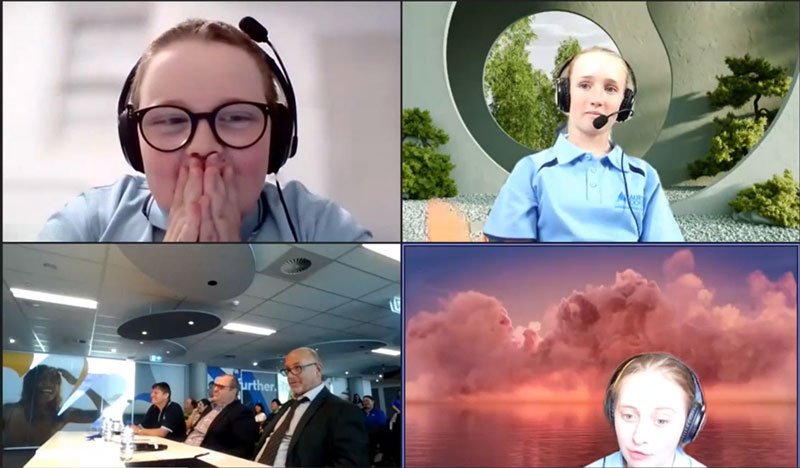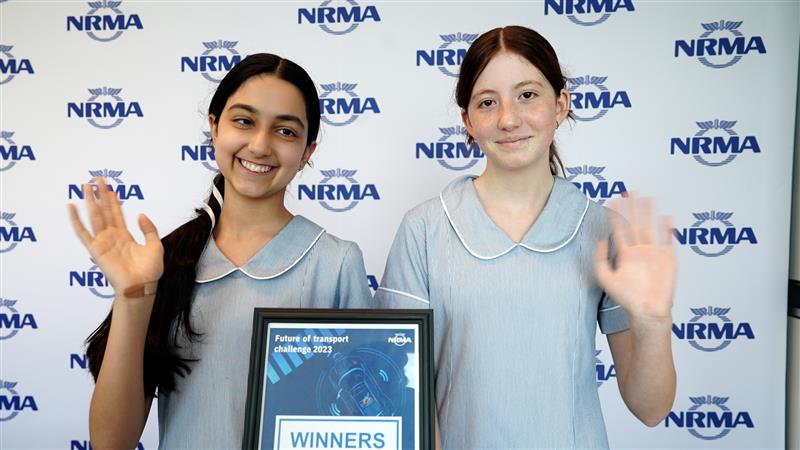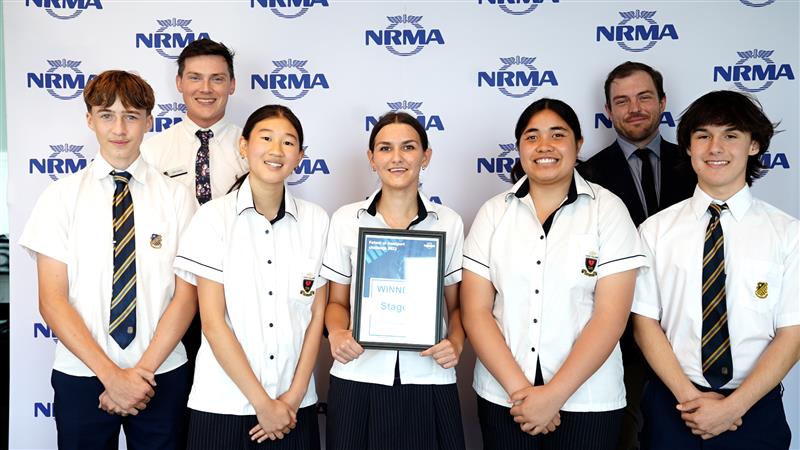2023 NRMA Future of Transport Challenge – Winners
Stage 3 Winners
Students from Year 5 at Aurora College, won the Stage 3 NRMA Future of Transport Challenge with their project “EN.E.V”. They won with their very strong business case solution to energy shortages. EV’s will be leased at a discounted rate to those with solar panels on their homes. In exchange for the discounted leasing of the electric vehicle, the company will access the stored power in the batteries to be exported to the grid when demand is high.

Stage 3 winners from Aurora College
Congratulations to the finalists for fantastic projects:
St Joachims Catholic Primary School with their project “SecureDriveSafe”, a car is equipped with strong magnets that repel the other vehicle, hence reducing the number of crashes on our roads.
Cambewarra Public School with their project “DermCar”, a car that both regenerates itself and creates power all with only its skin. Based on photosynthetic cells, the car will draw power from the sun to run and will rebuild itself when damaged.
Stage 4 Winners
Students from Year 8 at Mount St Joseph College, won the Stage 4 NRMA Future of Transport Challenge with their project “EyeAlert”. They have developed a device that is fitted in the front windscreen of the car that will help to reduce road crashes by limiting distractions through monitoring eye movements. If the driver's eyes drift away from the road, a buzzing noise will alert the driver.

Stage 4 winners from Mount St Joseph College
All finalists are to be congratulated on their polished final projects:
Davidson High School with their project “B.T.T.M.T.S.”. B.T.T.M.T.S stand for Bus-Train-Tram-Modular-Transport-Systems and it is a track system that allows all forms of public transport to utilise the track systems of other transport types. B.T.T.M.T.S is built around rapid adaptive transport (RAT). A system consists of modules, a nose section, flexible connector sections, and an end cap and when upgraded with the new tracking system, will be able to run on all current tram, train and bus routes with a single vehicle.
Parramatta High School with their project “Sydney SkyFlow”. Cars will be put into pods and lifted onto a raised platform above the congested roads and utilise a series of glass tunnels that will have people at their destinations in far less time. Crashes will be reduced to zero with the tunnel and pod system being controlled by advanced AI.
Stage 5 Winners
Students from Year 10 at Waverley College and Our Lady of the Sacred Heart Kensington, won the Stage 5 NRMA Future of Transport Challenge with their project “SWIFTFOLD”. They have developed folding seats on public transport to make greater use of the space inside to accommodate more people. This is teamed with an app that allows people to book seating so they can travel with the confidence of knowing they have a seat.

Stage 5 winners from Waverley College and Our Lady of the Sacred Heart Kensington
Congratulations to the remaining stage 5 finalists who presented well on the day:
Cheltenham Girls High School with their project “Go for the Garden”. This project encourages people back onto busses with high tech self cleaning and an environmentally friendly garden on the bus roof.
Willoughby Girls High School with their project “WhipGuard”. A highly engineered car seat that will minimise the effects of whiplash and reduce huge insurance costs from injury.
All nine finalist teams pitched their innovative solutions to real-world transport problems to a panel of industry experts at the 3 final events for 2023. The judges were NRMA Roadside General Manager – Simon Denic, Fizzics Education Founder and CEO – Ben Newsome, and NSW Department of Education, TAS Curriculum Support Advisor 7–12 – Peter Davis.
In 2023 we held a face to face finals event at Sydney Olympic Park - you can watch the finals event here:
2022 NRMA Future of Transport Challenge – Winners
Stage 4 Winners
Congratulations to Davidson High School in Frenchs Forest on winning the Stage 4 2022 NRMA Future of Transport Challenge with their project ‘DOVS’. DOVS is a system that is installed in vehicles so that they can automatically send a report to 000 emergency services if the vehicle is involved in a severe crash. Installing DOVS will create a faster response time when vehicle incidents occur, leading to fewer deaths and injuries involving vehicles.

Jade from Davidson High School

Stage 5 Winners
Congratulations to Canley Vale High School on winning the Stage 5 2022 NRMA Future of Transport Challenge with their project ‘BookSafe’. BookSafe is a booking system of special train carriages where people use an app and their Opal card to book a train seat in these safe carriages. This means train commuters are able to take safe travelling into their own hands by choosing their own seats; reassuring commuters about their safety and assisting them to avoid crowded train carriages during peak times.

Talia, Megan, Judy and Chanraisarh from Canley Vale High School

These six finalists pitched their innovative solutions to real-world transport problems to a panel of industry experts at the 2 final events for 2022. The judges were NRMA Motoring & Membership CEO - Emma Harrington, NRMA EGM of Infrastructure and Energy – Carly Irving Dolan, NRMA Motoring & Membership GM for Customer Contact - Carolyn Darke, and STEM Advisor for the Department of Education & Senior Lecturer at the University of Newcastle - Dr Scott Sleap.
The Future of Transport Competition finals are presented as part of the Youth Eco Summit (YES) for secondary schools and this year was held as two live, virtual events. You can watch the finals event here:
